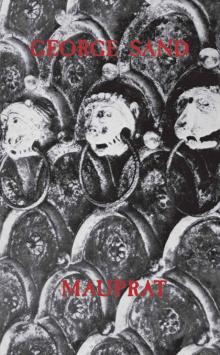- Home
- George Sand
Consuelo Page 6
Consuelo Read online
Page 6
"And what did the glass-blower's wife say?"
"She said: 'What is it to you? Mind your business. What has a married man to do with young girls?'"
"Did she appear angry?"
"Oh, very angry."
"It is a good sign. She knew that her husband was not far wrong. Well, what more?"
"Why, the Countess Moncenigo, who gives out work and has always been kind to me, said last week to Dr. Ancillo, who was there when I called: 'Only look, doctor, how this Zitella has grown, how fair she is and how well made!'"
"And what did the doctor say?"
"'Very true, madam,' said he; 'per Bacco! I should not have known her: she is one of those constitutions that become handsome when they gain a little fat. She will be a fine girl, you will see that.'"
"And what more?"
"Then the superior of Santa Chiara, for whom I work embroidery for the altars, said to one of the sisters: 'Does not Consuelo resemble Santa Cecilia? Every time that I pray before her image I cannot help thinking of this little one, and then I pray for her that she may never fall into sin and that she may never sing but for the church.'"
"And what said the sister?"
"The sister replied: 'It is true, mother—it is quite true.' As for myself, I hastened to the church and looked at their Cecilia, which is painted by a great master, and is very, very beautiful."
"And like you?"
"A little."
"And you never told me that?"
"I never thought of it."
"Dear Consuelo, you are beautiful then?"
"I do not think so; but I am not so ugly as they say. One thing is certain—they no longer call me ugly. Perhaps they think it would give me pain to hear it.'"
"Let me see, little Consuelo; look at me. First, you have the most beautiful eyes in the world."
"But my mouth is large," said Consuelo, laughing, and taking up a broken bit of looking-glass which served her as a pysche.
"It is not very small indeed, but then what glorious teeth!" said Anzoleto; "they are as white as pearls, and when you smile you show them all."
"In that case you must say something that will make me laugh, when we are with the count."
"You have magnificent hair, Consuelo."
"Oh yes; would you like to see it?" and she loosed the pins which fastened it, and her dark shining locks fell in flowing masses to the floor.
"Your chest is broad, your waist small, your shoulders—ah, they are beautiful, Consuelo!"
"My feet," said Consuelo, turning the conversation, "are not so bad;" and she held up a little Andalusian foot, a beauty almost unknown in Venice.
"Your hand is beautiful, also," said Anzoleto, kissing for the first time that hand which he had hitherto clasped only in compassion. "Let me see your arms."
"But you have seen them a hundred times," said she, removing her long gloves.
"No; I have never seen them," said Anzoleto, whose admiration every moment increased, and he again relapsed into silence, gazing with beaming eyes on the young girl, in whom each moment he discovered new beauties.
All at once Consuelo, embarrassed by this display, endeavored to regain her former quiet enjoyment, and began to pace up and down the apartment, gesticulating and singing from time to time in a somewhat exaggerated fashion, several passages from the lyric drama, just as if she were a performer on the stage.
"Magnificent!" exclaimed Anzoleto, ravished with surprise at finding her capable of a display which she had not hitherto manifested.
"It is any thing but magnificent," said Consuelo, reseating herself; "and I hope you only spoke in jest."
"It would be magnificent on the boards at any rate. I assure you there would not be a gesture too much. Corilla would burst with jealousy, for it is just the way she gets on when they applaud her to the skies."
"My dear Anzoleto, I do not wish that Corillo should grow jealous about any such nonsense; if the public were to applaud me merely because I knew how to ape her, I would never appear before them."
"You would do better then?"
"I hope so, or I should never attempt it."
"Very well; how would you manage?"
"I cannot say."
"Try."
"No; for all this is but a dream; and until they have decided whether I am ugly or not, we had better not plan any more fine projects. Perhaps we are a little mad just now, and after all, as the count has said, Consuelo may be frightful."
This last supposition caused Anzoleto to take his leave.
CHAPTER IX
AT this period of his life, though almost unknown to biographers, Porpora, one of the best Italian composers of the eighteenth century, the pupil of Scarlatti, the master of Hasse, Farinelli, Cafariello, Mingotti, Salimbini, Hubert (surnamed the Porporino), of Gabrielli, of Monteni—in a word, the founder of the most celebrated school of his time—languished in obscurity at Venice, in a condition bordering on poverty and despair. Nevertheless, he had formerly been director of the conservatory of the Aspedaletto in the same city, and this period of his life had been even brilliant. He had there written and performed his best operas, his most beautiful cantatas, and his finest church music. Invited to Vienna in 1728, he had there after some effort gained the favor of the Emperor Charles VI. Patronized at the court of Saxony, where he gave lessons to the electoral princess, Porpora from that repaired to London, where he rivaled for nine or ten years the glory of Handel, the master of masters, whose star at that period had begun to pale. The genius of the latter, however, obtained the supremacy, and Porpora, wounded in pride and purse, had returned to Venice to resume the direction of another conservatory. He still composed operas, but found it difficult to get them represented. His last, although written in Venice, was brought out in London, where it had no success. His genius had incurred these serious assaults, against which fortune and glory might perhaps have sustained him; but the neglect and ingratitude of Hasse, Farinelli, and Cafariello, broke his heart, soured his character, and poisoned his old age. He is known to have died miserable and neglected in his eightieth year at Naples.
At the period when Count Zustiniani, foreseeing and almost desiring the defection of Corillo, sought to replace her, Porpora was subject to violent fits of ill humor, not always without foundation; for if they preferred and sang at Venice the music of Jomilli, of Lotti, of Carissimi, of Gaspirini, and other excellent masters, they also adopted without discrimination the productions of Cocchi, of Buini, of Salvator Apollini, and other local composers, whose common and easy style served to flatter mediocrity. The operas of Hasse could not please a master justly dissatisfied. The worthy but unfortunate Porpora, therefore, closing his heart and ears alike to modern productions, sought to crush them under the glory and authority of the ancients. He judged too severely of the graceful compositions of Galuppi, and even the original fantasias of Chiozzetto, a favorite composer at Venice. In short, he would only speak of Martini, Durante, Monte Verde, and Palestrina; I do not know if even Marcello and Leo found favor in his eyes. It was therefore with reserve and dissatisfaction that he received the first overtures of Zustiniani concerning his poor pupil, whose good fortune and glory he nevertheless desired to promote; for he had too much experience not to be aware of her abilities and her deserts. But he shook his head at the idea of the profanation of a genius so pure, and so liberally nurtured on the sacred manna of the old masters, and replied—"Take her if it must be so—this spotless soul, this stainless intellect—cast her to the dogs, hand her over to the brutes, for such seems the destiny of genius at the period in which we live."
This dissatisfaction, at once grave and ludicrous, gave the count a lofty idea of the merit of the pupil from the high value which the severe master attached to it.
"So, so, my dear maestro," he exclaimed; "is that indeed your opinion? is this Consuelo a creature so extraordinary, so divine?"
"You shall hear her," said Porpora, with an air of resignation, while he murmured, "It is her destiny."
&n
bsp; The count succeeded in raising the spirits of the master from their state of depression, and led him to expect a serious reform in the choice of operas. He promised to exclude inferior productions so soon as he should succeed in getting rid of Corilla, to whose caprices he attributed their admission and success. He even dexterously gave him to understand that he would be very reserved as to Hasse; and declared that if Porpora would write an opera for Consuelo, the pupil would confer a double glory on her master in expressing his thoughts in a style which suited them, as well as realize a lyric triumph for San Samuel and for the count.
Porpora, fairly vanquished, began to thaw, and now secretly longed for the coming out of his pupil, as much as he had hitherto dreaded it from the fear that she should be the means of adding fresh luster to the productions of his rivals. But as the count expressed some anxiety touching Consuelo's appearance, he refused to permit him to hear her in private and without preparation.
"I do not wish you to suppose," said he, in reply to the count's questions and entreaties, "that she is a beauty. A poorly dressed and timid girl, in presence of a nobleman and a judge—a child of the people, who has never been the object of the slightest attention—cannot dispense with some preparatory toilet. And besides Consuelo is one whose expression genius ennobles in an extraordinary degree. She must be seen and heard at the same time. Leave it all to me; if you are not satisfied you may leave her alone, and I shall find out means of making her a good nun, who will be the glory of the school and the instructress of future pupils." Such in fact was the destiny which Porpora had planned for Consuelo.
When he saw his pupil again, he told her that she was to be heard and an opinion given of her by the count; but as she was uneasy on the score of her looks, he gave her to understand that she would not be seen—in short, that she would sing behind the organ-screen, the count being merely present at the service in the church. He advised her, however, to dress with some attention to appearance, as she would have to be presented, and though the noble master was poor he gave her money for the purpose. Consuelo, frightened and agitated, busied for the first time in her life with attention to her person, hastened to see after her toilet and her voice. She tried the last, and found it so fresh, so brilliant, and so full, that Anzoleto, to whom she sung, more than once repeated with ecstasy, "Alas! why should they require more than that she knows how to sing?"
CHAPTER X
ON the eve of the important day, Anzoleto found Consuelo's door closed and locked, and after having waited for a quarter of an hour on the stairs, he finally obtained permission to see his friend in her festal attire, the effect of which she wished to try before him. She had on a handsome flowered muslin dress, a lace handkerchief, and powder. She was so much altered, that Anzoleto was for some moments uncertain whether she had gained or lost by the change. The hesitation which Consuelo read in his eyes was as the stroke of a dagger to her heart.
"Ah!" said she, "I see very well that I do not please you. How can I hope to please a stranger, when he who loves me sees nothing agreeable in my appearance?"
"Wait a little," replied Anzoleto. "I like your elegant figure in those long stays, and the distinguished air which this lace gives you. The large folds of your petticoat suit you to admiration, but I regret your long black hair. However, it is the fashion, and tomorrow you must be a lady."
"And why must I be a lady? For my part I hate this powder, which fades one, and makes even the most beautiful grow old before her time. I have an artificial air under all these furbelows; in short I am not satisfied with myself, and I see you are not so either. Oh! by the bye, I was at rehearsal this morning, and saw Clorinda, who also was trying on a new dress. She was so gay, so fearless, so handsome (oh! she must be happy—you need not look twice at her to be sure of her beauty), that I feel afraid of appearing beside her before the count."
"You may be easy; the count has seen her, and has heard her too."
"And did she sing badly?"
"As she always does."
"Ah, my friend, these rivalries spoil the disposition. A little while ago, if Clorinda, who is a good girl notwithstanding her vanity, had been spoken of unfavorably by a judge, I should have been sorry for her from the bottom of my heart; I should have shared her grief and humiliation; and now I find myself rejoicing at it! To strive, to envy, to seek to injure each other, and all that for a man whom we do not love, whom we do not even know! I feel very low-spirited, my dear love, and it seems to me as if I were as much frightened by the idea of succeeding as by that of failing. It seems as if our happiness was coming to a close, and that tomorrow after the trial, whatever may be the result, I shall return to this poor apartment a different person from what I have hitherto lived in it."
Two large tears rolled down Consuelo's cheeks.
"What! are you going to cry now?" said Anzoleto. "Do you think of what you are doing? You will dim your eyes and swell your eyelids. Your eyes, Consuelo! do not spoil your eyes, with are the most beautiful feature in your face."
"Or rather the least ugly," said she, wiping away her tears. "Come, when we give ourselves up to the world we have no longer any right to weep."
Her friend tried to console her, but she was exceedingly dejected all the rest of the day; and in the evening, as soon as she was alone, she carefully brushed out the powder, combed and smoothed her ebon hair, tried on a little dress of black silk, still fresh and well preserved, which she usually wore on Sundays, and recovered some portion of her confidence on once more recognizing herself in her mirror. Then she prayed fervently and thought of her mother, until, melted to tears, she cried herself to sleep. When Anzoleto came to seek her the next day in order to conduct her to the church, he found her seated before her spinet, dressed as for a holyday, and practicing her trial piece. "What!" cried he, "your hair not dressed! not yet ready! It is almost the hour. What are you thinking of, Consuelo?"
"My friend," answered she resolutely, "my hair is dressed, I am ready, I am tranquil. I wish to go as I am. Those fine robes do not suit me. You like my black hair better than if it were covered with powder. This waist does not impede my breathing. Do not endeavor to change my resolution; I have made up my mind. I have prayed to God to direct me, and my mother to watch over my conduct. God has directed me to be modest and simple. My mother has visited me in my dreams, and she said what she has always said to me; 'Try to sing well—Providence will do the rest.' I saw her take my fine dress, my laces and my ribbons, and arrange them in the wardrobe; and then she put my black frock and my mantilla of muslin on the chair at the side of my bed. As soon as I awoke I put past my costume as she had done in the dream, and I put on the black frock and mantilla which you see. I feel more courage since I have renounced the idea of pleasing by means which I do not know how to use. Now, hear my voice; everything depends on that, you know." She sounded a note.
"Just Heavens! we are lost," cried Anzoleto; "your voice is husky and your eyes are red. You have been weeping yesterday evening, Consuelo; here's a fine business! I tell you we are lost; you are foolish to dress yourself in mourning on a holyday—it brings bad luck and makes you ugly. Now quick! quick! put on your beautiful dress, while I go and buy you some rouge. You are as pale as a specter."
This gave rise to a lively discussion between them. Anzoleto was a little rude. The poor girl's mind was again agitated, and her tears flowed afresh. Anzoleto was irritated still more, and in the midst of their debate the hour struck—the fatal hour (a quarter before two), just time enough to run to the church and reach it out of breath. Anzoleto cursed and swore. Consuelo, pale and trembling as the star of the morning which mirrors itself in the bosom of the lagunes, looked for the last time into her little broken mirror; then turning, she threw herself impetuously into Anzoleto's arms. "Oh, my friend," cried she, "do not scold me—do not curse me. On the contrary press me to your heart, and drive from my cheek this deathlike paleness. May your kiss be as the fire from the altar upon the lips of Isaiah, and may God not punish us for hav
ing doubted his assistance."
Then she hastily threw her mantilla over her head, took the music in her hand, and dragging her dispirited lover after her, ran toward the church of the Mendicanti, where the crowd had already assembled to hear the magnificent music of Porpora. Anzoleto, more dead than alive, proceeded to join the count, who had appointed to meet him in his gallery; and Consuelo mounted to the organ loft, where the choir was already arranged, and the professor seated before his desk. Consuelo did not know that the gallery of the count was so situated as to command a full view of the organ loft, that he already had his eyes fixed upon her, and did not lose one of her movements.
But he could not as yet distinguish her features, for she knelt on arriving, hid her face in her hands, and began to pray with fervent devotion. "My God," said she, in the depths of her heart, "thou knowest that I do not ask Thee to raise me above my rivals in order to abase them. Thou knowest that I do not wish to give myself to the world and to profane arts, in order to abandon Thy love, and to lose myself in the paths of vice. Thou knowest that pride does not swell my soul, and that it is in order to live with him whom my mother permitted me to love, never to separate myself from him, to ensure his enjoyment and happiness, that I ask Thee to sustain me, and to ennoble my voice and my thoughts when I shall sing Thy praise!"
When the first sound of the orchestra called Consuelo to her place, she rose slowly, her mantilla fell from her shoulders, and her face was at length visible to the impatient and restless spectators in the neighbouring tribune. But what marvelous change is here in this young girl, just now so pale, so cast down, so overwhelmed by fatigue and fear! The ether of heaven seemed to bedew her lofty forehead, while a gentle languor was diffused over the noble and graceful outlines of her figure. Her tranquil countenance expressed none of those petty passions which seek, and as it were exact, applause. There was something about her, solemn, mysterious, and elevated—at once lovely and affecting.

 Lelia
Lelia Mauprat
Mauprat Valentine
Valentine The Countess von Rudolstadt
The Countess von Rudolstadt Laura
Laura Indiana (Oxford World's Classics)
Indiana (Oxford World's Classics)